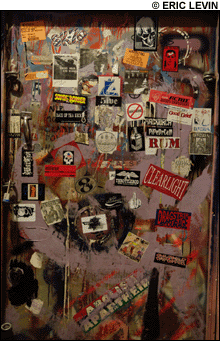 Wandering around the Fenway’s soon-to-be-demolished RFT building feels like spelunking through the bowels of Boston’s hard-rock scene. That feeling is especially pronounced in the basement, a labyrinth of recently vacated practice spaces and death-row-style hallways that reeks of stale beer and crushed cigarettes — eau de rock toilette. Brown water stains freckle the walls. Old show fliers are duct-taped to surfaces. Broken amps, split drumsticks, fast-food wrappers are discarded in corners. Even long-time superintendent and default tour guide Alvan Long notices the space’s uncannily cavernous quality, likening an upright-beer-bottle cluster to "upside-down stalactites" as he comments on the dramatic effect of a "lonely black-and-white Joan Jett poster" that’s still clinging to a practice space shared by the Call Up, Bury the Needle, and the Bismarck.
Wandering around the Fenway’s soon-to-be-demolished RFT building feels like spelunking through the bowels of Boston’s hard-rock scene. That feeling is especially pronounced in the basement, a labyrinth of recently vacated practice spaces and death-row-style hallways that reeks of stale beer and crushed cigarettes — eau de rock toilette. Brown water stains freckle the walls. Old show fliers are duct-taped to surfaces. Broken amps, split drumsticks, fast-food wrappers are discarded in corners. Even long-time superintendent and default tour guide Alvan Long notices the space’s uncannily cavernous quality, likening an upright-beer-bottle cluster to "upside-down stalactites" as he comments on the dramatic effect of a "lonely black-and-white Joan Jett poster" that’s still clinging to a practice space shared by the Call Up, Bury the Needle, and the Bismarck.
These are the last days of the "Tire Building," a Boylston Street Boston-rock redoubt that over the past 19 years has housed 30 practice spaces, more than five recording studios, four artist workrooms, and even a few label offices. Boston exports like ’Til Tuesday, Blake Babies, and Powerman 5000 once ran through songs in this cellar. Thurston Moore, Cave In, and Isis have either recorded or had releases mastered here. Weezer once rehearsed in the building for a few days (long enough to draw fan mail), Godsmack laid their multi-platinum breakthrough onto tape here, and Jason Priestley helped bankroll a rock label that’s headquartered upstairs. More important, someone you know has more than likely gotten liquored up in this building — countless artists have come through here in the last two decades.

"It’s like the Middle East [Club] of recording studios," says Kurt Ballou, Converge guitarist and owner of Salem’s GodCity Recording Studio. "The place has a lot to do with how the underground rock scene works in Boston. A lot of people have met each other just from being around. It’s a nexus."
That loose community was threatened last November when the Russo Family Trust, the building’s longstanding owners, notified New Alliance co-founder Long that they’d sold the local-rock nerve center’s grounds. As part of the rapid redevelopment of the Fenway, the building will be replaced by a 14-story development housing condominiums, apartments, office space, and retail. After 19 years in residence, rock and roll will have to vacate the premises in a few months. And since Long is the first to admit that neither New Alliance nor his local label Curve of the Earth have been particularly lucrative — Long’s wife and Curve co-owner Gail Rush points out that Long pumps his earnings back into the studio — he doesn’t have the money to lease another building. For a time, it looked as if New Alliance’s creative nexus would be dismantled.
But then Bill "Des" Desmond stepped in. Widely known as the demented mastermind behind the Bentmen (self-described "Kings of the Boston underground" best known for dressing up freakily and attacking their audiences with silly string and paint), Desmond also owns the Sound Museum, a local chain of practice-space buildings. At the time, Desmond had a fifth building in Cambridge near Central Square that he’d planned to use as a Sound Museum expansion; hearing about Long’s crisis, he offered to relocate New Alliance there. (Desmond doesn’t yet want to disclose the site’s exact coordinates, citing unresolved security and neighborhood issues.) Long agreed to manage the building, and so next month, New Alliance will effectively "merge" (Des’s words) with the Sound Museum.
Nevertheless, this is still an ending. The transition won’t be seamless — Desmond’s building isn’t prepped for practice spaces or recording studios. And no one’s exactly sure how financially feasible it will be for New Alliance to rebuild when home recording has become a cheap alternative to studio sessions, thanks to relatively affordable advances in digital audio software.
But New Alliance has a lot of support. For starters, Alvan Long has been in the Boston music business for decades — the fiftysomething visual artist/musician/label owner was elected to local-music rag the Noise’s Hall of Fame in 2002. Bands from all over town have already offered to come swing hammers.
"A few months ago, we were talking about building a new studio," says Duncan Wilder Johnson, a performer signed to Ken Cmar’s Wonderdrug Records, a label also housed in the RFT building. "I turned to Al and was like, ‘How was this studio built?’ And he was like, ‘Bit-by-bit and half-assed.’"
Rush adds matter-of-factly, "And the new one will be too."